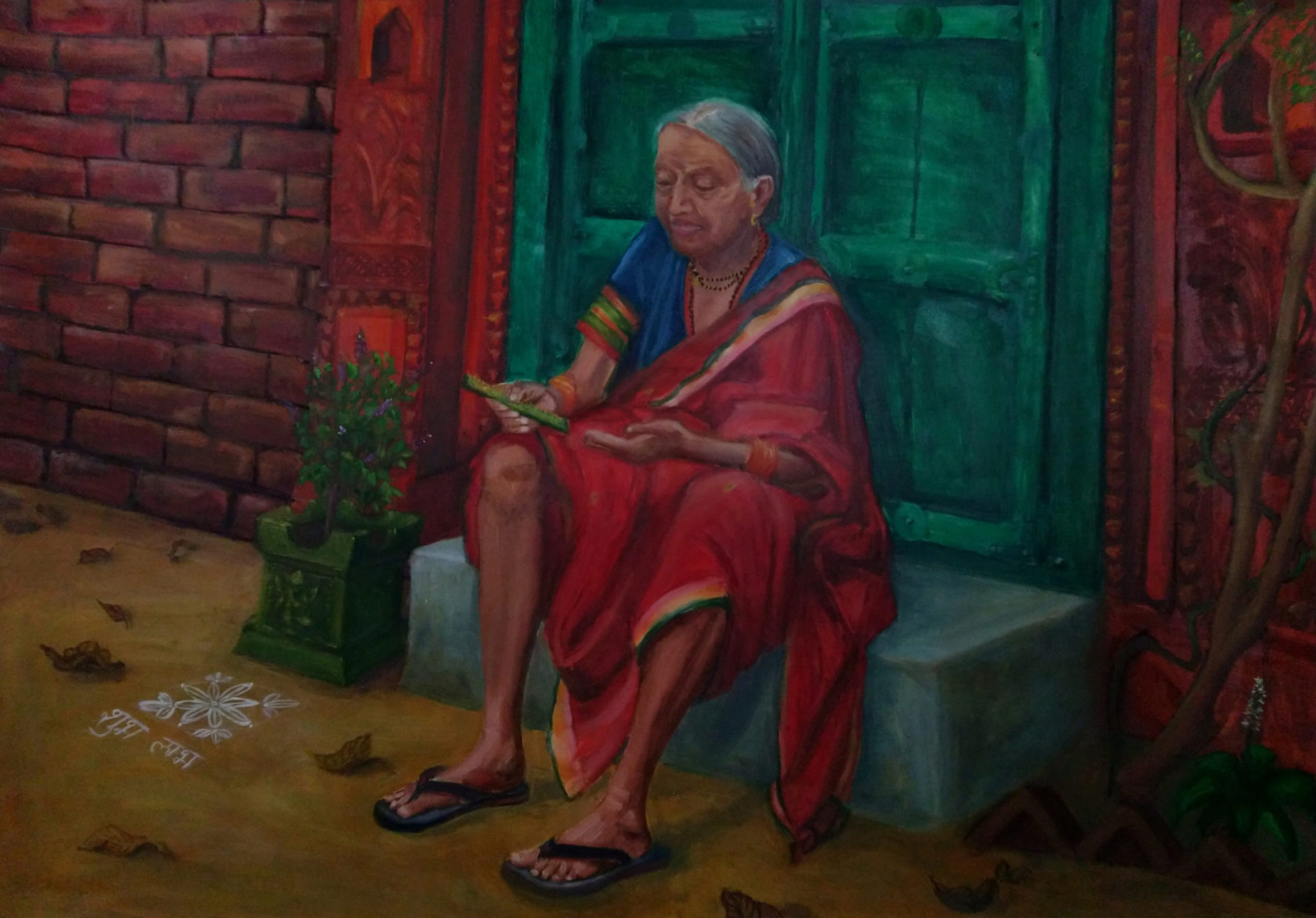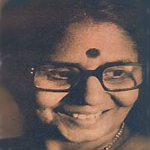TRANSLATED FROM THE HINDI BY RITUPARNA MUKHERJEE

Image Used for Representation
Soma Bua was old.
Soma Bua was abandoned.
Soma Bua was lonely.
Soma Bua’s youth left her the day her young son died. Her husband was so stricken by the death of his only son that he left his wife, his home and family and became a pilgrim. There was no one in the family that could assuage her loneliness. Her melancholic life had seen no respite nor change in the last twenty years. Although her husband would come and stay with her for a month every year, she never waited for him. In fact, she appeared more despondent in her husband’s presence. She felt suffocated by her husband’s lack of affection and the flow of her mundane life seemed to be disturbed. In that one month she couldn’t meet other people freely or go out and the sanyasi did not care enough to offer some kind of solace to her, something to hold on to for the rest of the year in his absence. Bua had to mostly rely on her friends and neighbors in her situation. Whether it was a mundan, a puja, a thread ceremony or a marriage, she was the first one to reach and would work with such heart as if it was her own family.
Soma Bua’s husband was home at that time and there had been an argument just a while back. Bua sat in the courtyard in the warmth of the sun, applying oil to her hands from a bowl near her, muttering something to herself. In that one month her tongue took precedence over her other organs that seemed to get slack. It became more proactive as it were. Radha Bhabhi came down at that moment carrying some papad and a torn saree in her hands. “What’s wrong Bua? What are you muttering? Has Sanyasi Maharaj told you something again?”
“He doesn’t like me going anywhere. Yesterday, it was the mundan ceremony of Kishorilal’s son. The entire neighborhood had been invited. I am aware that he is showing off his wealth by inviting the whole neighborhood, but the new brides in his household are not skilled enough to handle such a big ceremony by themselves. So, I reached early to help them out. I was right, you know.” Bua took the papad from Radha’s hands and began spreading them out to dry. “Not even a single thing was being done in the right manner. They would only have been able to get it right if there was an older, more experienced person showing them the way. The women were singing marriage songs at a mundan ceremony! It was so funny!” This small memory washed away the pain and resentment of a while ago. She said in her natural self, “When I looked inside the kitchen, I saw the cooks serve samosas that were still a little raw, and they had made so many of them that each person could be fed twice. While the gulabjamuns were so few that there wasn’t even one each for every person present. I immediately sifted the flour and made fresh gulabjamuns. The two wives and Kishorilal were both embarrassed and relieved. They kept saying- ‘Amma, how would we have managed without you here today? You have saved our faces.’ I assured them that if the neighbors don’t help out, who else will? I would have come sooner if I didn’t have to take care of my husband’s breakfast and lunch.”
“So, why was Sanyasi Maharaj unhappy? He doesn’t like you going anywhere Bua!”
“He doesn’t customarily like me going out and mixing with other people. Besides, Kishorilal had not invited us personally. I tried to reason with him that the people who are close to you need not be formally invited. They respect me as if I were their own mother, otherwise who would leave you the responsibility of the kitchen and pantry? It is impossible to reason with him! He told me that I meddle in other people’s affairs.” She immediately recalled his harsh, angry words that had rained down on her a few moments back. Her eyes welled at the recollection.
“Why are you crying Bua? These arguments are common between husband and wife. Sanyasi Maharaj merely stays for a month. Why don’t you just gulp it down and get on with it?”
“I listen to his words quietly my dear but they pain my heart and I often wonder why he cannot bring himself to talk amicably for the short while he is here. Tell me Radha, he stays at Haridwar for eleven months of a year, why does he object if I go anywhere in the neighborhood? He doesn’t care about his relatives and friends but I need these bonds. How will it look if I disconnect myself from everyone like he has? I have told him repeatedly that if he has chosen to be with me, he should keep me by his side till one of us dies. He can’t even do this much. Why should I be alone and keep waiting for him while he reaps the benefits of good deeds and gathers fame? On top of that he cannot tolerate it if I go anywhere at all…” Bua broke down in tears. Radha consoled her and said, “Please don’t cry Bua! Perhaps he was angry because you went there without a formal invitation.”
“Maybe they forgot to invite me in the hustle and bustle. Should I punish them for this little oversight? I am family. Why does family need to be invited formally? I just need love and affection from my kin. If someone isn’t affectionate, I would never visit their house even if they invite me ten times and if someone is respectful, I will maintain the ties and do my duties even if they don’t call me. Would I have waited for an invitation had it been my own Harkhu’s home and a ceremony at his place? For me, Kishorilal is the same as Harkhu! My Harkhu is not there with me now, that is why I fill my empty heart with the love I get from others.” She started hiccupping.
Radha said softly while collecting the dried papad, “Bua! It is so like you to overthink things. Hush, stop crying now. Let me fry some papad for you. Taste them and tell what you think.” Radha took the dried papad in her saree and went upstairs.
A week later, Bua came to Sanyasi ji in happy spirits and said, “Some girl in your brother’s in-laws’s family will be married to Bhagirath ji’s household. The marriage will take place here. Even though we haven’t been in touch with them after your brother’s demise, they are after all our relatives. I am sure they will invite you. How can they forget their relative?” Bua laughed in joy. Sanyasi ji’s scornful silence did hurt her a little but she was happy nonetheless. She would check on the progress of the marriage and share with us the news. Finally, the day came when she heard that her brother-in-law’s relatives had arrived in the neighborhood. The preparations for the marriage went on in full swing, all the relatives and the entire neighborhood would be invited, it would be a marriage of pomp and splendor. After all, both the sides came from money.
“I don’t know if we would get an invite. It has been twenty-five years since my brother-in-law passed away. Ever since his death we haven’t kept in touch with his in-laws. Who would have kept in touch? This is the work of a man. And I, who have a husband, is bereft of one.” She let out a deep, heartfelt sigh.
“Bua, why won’t you be invited? Even though you have not kept in touch, can one ever forget one’s relatives?”, Bari Bahu said while grinding the lentils. “Bua your name’s there. I have gone through the entire list”, said my widowed sister-in-law. Bua came closer and asked excitedly, “You have seen my name with your own eyes? My name should be there. But I was doubtful if people still invite old relatives in today’s fashionable age.” Bua left immediately and went to her own house and met Radha, “You must know what to gift a newly-wed bride in the current fashion. They are my relatives after all, moneyed people. I can’t go empty-handed. I am from an older generation. Tell me, what can I gift? I can’t order a customized gift. There’s just two days to the wedding, so you will have to buy something ready-made.”
“What do you want to give- jewellery, clothes, cosmetics or something made of silver?”
“I don’t understand these things, my dear. I am giving you whatever I have. Bring whatever you think is suitable. Just see to it that no one makes a joke at my expense! First let me see how much money I have.” She came downstairs and took out a small box kept beneath bundles of her clothes. She opened it carefully. The box had seven rupees, some change and a ring. Bua had perhaps expected that she would have a little more money, but she became a little worried when she discovered she had just seven rupees. No one in her rich relative’s house would welcome her properly if she took something worth seven rupees. Her eyes fell on the ring. It was the only semblance of her dead son. She had not parted with that ring even in the most difficult of economic struggles. Even today, her heart missed a beat when she touched the ring. However, she tied five rupees and that ring securely in the border of her saree. She shut the box and went upstairs. But this time her excitement had waned a little, her steps were slower. She told Radha, “I couldn’t arrange for the money Bahu. I don’t have a son who earns money. The rent that I get from the house barely takes care of my basic expenses.” She started weeping. Radha said, “What do I do Bua? I don’t have much money myself now-a-days otherwise I would have given you some. But why are you worrying so much about the gift? People don’t care for the custom of gift-giving anymore.”
“No, Radha, they are after all my relatives. They haven’t forgotten me in these twenty-five years. How can I go empty-handed? No, no, I would rather not go.”
“Then don’t go. They won’t even miss you amidst so many people.” For Radha, this was the simplest solution to the problem.
“They will be upset. If all the people in this town go and I don’t, they would definitely think that I have forsaken kinship ties just because my brother-in-law is no more. No, you had better sell this ring.” She kept the old-fashioned ring in Radha’s palms. She urged, “You are aware of how the market works Radha. Sell this and get whatever is suitable. Just see to it that my dignity is maintained.”
When she heard the voice of the bangle seller in the alley, Bua’s eyes glanced at her old, stained bangles. She didn’t have any jewellery on her and was considering getting some glass bangles for the visit to her relatives the next day. But she hesitated, suddenly embarrassed. What if someone saw her? But her momentary reluctance subsided and she made her way to the back door and got herself green and red bangles for one rupee. But she went around the entire day hiding her hands in her saree as best as she could.
In the evening Radha Bhabhi brought along with her a silver box for sindoor, a saree and a blouse piece. Bua was very happy seeing all the gifts. She joyfully dreamt of the moment when she would hand over the gifts to the newly wed. How happy her relatives would be! They would sing such praises of her kindness and affability. The sadness of selling the ring was somewhat mitigated. She got some yellow dye worth one anna from the grocery next door and dyed her saree at night. Would it look appropriate if she wore a white saree to a wedding? When she lay down at night, her heart raced towards the next day.
The next day she finished eating at nine in the morning. When she looked at her dyed saree, she felt something was missing. She went upstairs to Radha, “Radha when you wear dyed sarees, they seem so bright, they shine. Why doesn’t mine look the same?”
“Well you didn’t dye your hair, did you? You should have added some starch to the saree dye. Don’t worry, add some now. When have they called you?”
“Don’t tell me about these newly fashionable people! They only summon people at the very last moment. The wedding is supposed to start at five in the evening. They will send for me anytime now.”
Radha Bhabhi smiled to herself.
Bua starched her saree and dried it in the sun. She took out a new plate and a crochet tablecloth she had made in her youth. She placed the saree, the silver sindoor box, a coconut and a few sugar candies and showed it to Radha. Meanwhile Sanyasi Maharaj had been skeptically noticing all the preparations and he kept warning Bua innumerable times, asking her not to go unless invited, saying the consequences of that wouldn’t be good. Bua would retort each time with confidence, “Do you think I’m mad that I’ll go without being invited? You know Nanda from our neighborhood, don’t you? She has seen our names on the list with her own eyes. And why won’t they want us there? They have called the entire town for this wedding and won’t invite their own relatives?”
When Radha Bhabhi saw Bua pace the terrace absent-mindedly around three in the afternoon, she asked, “Bua, why haven’t you gone already?”
Bua came out of her trance with a start, “What is the time Radha?… What did you say? Three, is it? The day passes by so fast in winters. Its only three in the afternoon but the sun has receded so much as if its evening already.” Realizing suddenly that she had not really answered Radha’s question, she responded coldly, “Well, the wedding is scheduled at five. If I go, I will leave at four, its just three now.” She cautiously put an ounce of nonchalance in her voice. She stood at the terrace with her eyes stuck to the alley out front. Behind her lay the saree she had dyed, the particles of mica gleamed in the sun with just the kind of sparkle that appeared on her face each time she would spot someone in the lane.
In the darkness of the evening at seven, Radha saw a silhouette stuck to the wall with its face to the alley. Her heart felt heavy. She didn’t ask anything, just remarked softly, “Bua! Why are you standing out here in the cold? Won’t you prepare dinner tonight? Its already seven.” Bua responded as if waking up from a light slumber, “Its seven already?” Then, as if speaking to herself, she asked, “But how can it be seven? The wedding was scheduled at five!” Realizing the entire situation, she controlled the tremor in her voice and said, “Well, dinner is no matter, is it? I will prepare it right now. Its just for us two, there is nothing elaborate to cook, is there?”
She took off the dyed saree. Once downstairs, she looked at it carefully and folded it away, took off her bangles, one by one, picked up all the things decorated in the plate and stored all of them in her trunk lovingly. And with a damp heart, she lit the stove.
Notes:
Bua: aunt from the father’s side
Mundan: shaving of head for religious purposes
Papad: lentil cakes
Gulabjamun: a fried sweet
Sindoor: a red powder worn by married Hindu women
Also, read A City Without Women by Sakyajit Bhattacharya translated into English by Adrija Ghosh and published in The Antonym
Follow The Antonym’s Facebook page and Instagram account for more content and interesting updates.



























0 Comments